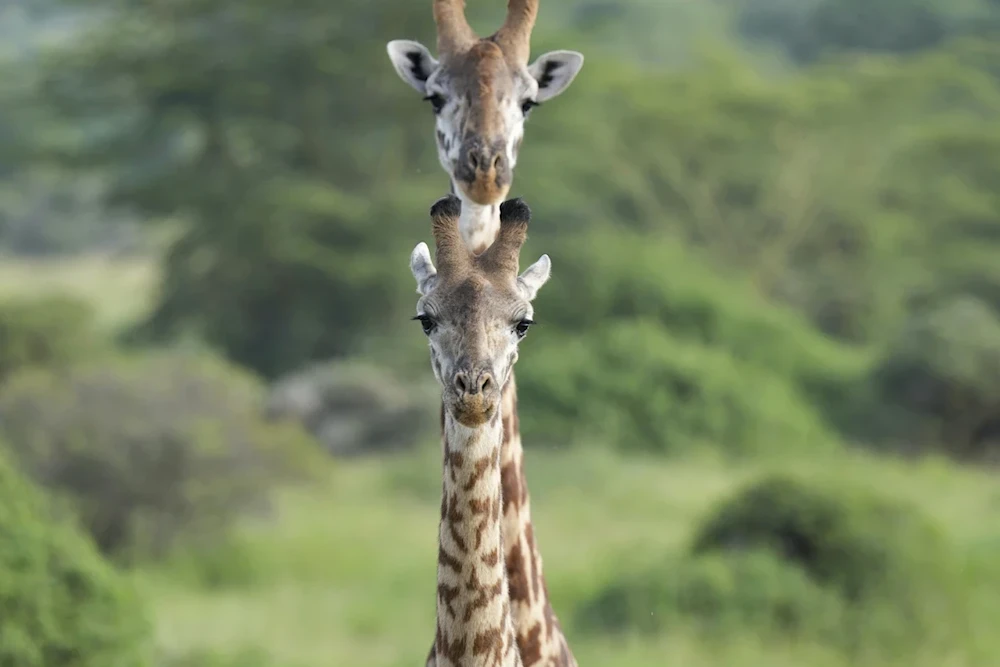Global wildlife study reveals decline in genetic diversity
A comprehensive study of over 600 animal and plant species has found a global decline in genetic diversity, raising concerns over biodiversity loss and ecosystem resilience.
-

Two giraffes roam around Nairobi National Park, on the outskirts of Nairobi, on Wednesday, January 31, 2024, in Nairobi, Kenya. (AP)
Scientists warn that shrinking genetic variation could weaken species' ability to adapt to environmental changes, including climate fluctuations and disease outbreaks.
A global analysis of more than 600 species has revealed a decline in genetic diversity among animals and plants over the past three decades.
Published in the journal Nature, the study found that two-thirds of the populations examined experienced declines in genetic diversity. However, researchers emphasized that urgent conservation efforts could prevent further losses and even restore diversity levels.
Dive deeper
A team of international scientists analyzed 882 studies measuring genetic diversity shifts between 1985 and 2019 across 628 species of animals, plants, fungi, and chromists (a distinct group of organisms). They described their work as "the most comprehensive investigation" into within-species genetic changes to date.
The study’s lead researcher, Assoc. Prof. Catherine Grueber of the University of Sydney, explained that genetic variation within a species—differences between individual members—enhances a population’s ability to survive environmental changes.
"If a new disease comes through, or there’s a heatwave, there may be some individuals in the population that have certain characteristics that enable them to tolerate those new conditions," she said.
"Those characteristics will get passed on to the next generation, and the population will persist instead of going extinct."
Why it matters
Maintaining genetic diversity in both wild and domesticated species is a key goal outlined in the 2022 biodiversity agreement at COP15.
Many of the primary drivers of genetic diversity loss are the same as those responsible for declining species populations. Grueber noted, "Things like habitat loss, climate change, invasive species, new diseases."
The study found that 65% of the populations analyzed faced ecological disruptions, including human activity such as land-use changes, harvesting, or direct interference. However, genetic diversity loss was also observed in populations where no disturbances had been recorded, indicating a persistent "background level of genetic diversity loss across species."
"We think that this represents the more general biodiversity crisis that the planet is facing, and broader effects of ecological disruptions [such as] climate change," Grueber said.
Despite these challenges, the researchers highlighted successful conservation efforts that have bolstered genetic diversity.
One example is a project in Western Australia to establish new populations of golden bandicoots, a threatened species. "By understanding where they were selecting the animals from … and monitoring those populations using genetic studies, they were able to show that they could maintain the genetic diversity of those populations through multiple generations," Grueber said.
In the US, conservation biologists safeguarded genetic variation in black-tailed prairie dogs by applying insecticides to prevent fleas from spreading the plague. "The populations were able to thrive, and by moving around more in the landscape, they were able to interbreed with other prairie dogs," Grueber explained.
In Scandinavia, arctic fox populations—once heavily impacted by the fur trade—now struggle against red foxes for resources. However, conservation measures, including supplementary feeding and red fox removal, have contributed to a rise in genetic diversity.
"It’s important that we preserve the genetic diversity of our natural systems," Grueber emphasized. "We have the methods to make it work."
The meta-analysis covered species from 141 countries, including more than 500 animal species.

 3 Min Read
3 Min Read








